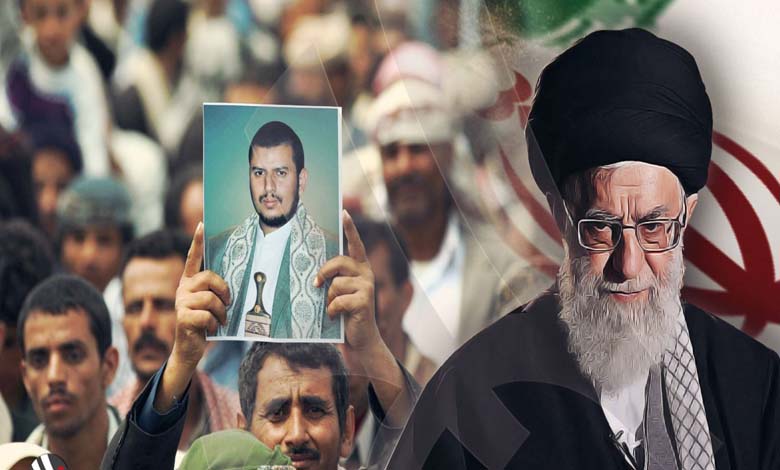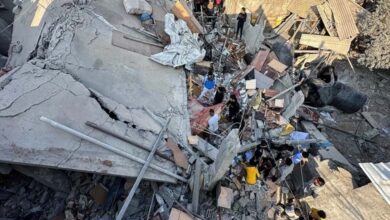Tehran Denies Supporting Houthis in UN Security Council
Western confirmations that Iranian weapons enhance the Houthis' ability to attack commercial ships and disrupt international trade

Iran’s permanent representative to the United Nations, Amir Saeed Iravani, stated that the U.S. accusations against his country of supporting the Houthis are baseless, saying that Tehran “has repeatedly declared that it is committed to relevant Security Council resolutions regarding the situation in Yemen and has not engaged in activities that violate those resolutions.” This is despite previous confirmations from several Iranian officials and Revolutionary Guard leaders of their support for the Houthis, as well as Hezbollah in Lebanon and Iraqi factions, in addition to Western reports.
Iravani said in a message to the current president of the Security Council that his country has always “emphasized the peaceful resolution of the Yemeni crisis through diplomatic channels and has expressed its commitment to maritime security and freedom of navigation.” He viewed that “America commits aggressive acts against Yemen’s sovereignty and territorial integrity, blatantly violating international laws, the UN Charter, and relevant Security Council resolutions.”
He also considered that “these blatant violations endanger regional peace and stability, hinder efforts to reach a peaceful solution in Yemen, and exacerbate the painful humanitarian crisis that is ravaging the country.” He added, “The United States bears full responsibility for these grave violations and cannot deny its responsibility. Therefore, using failed tactics and spreading lies and misinformation about the situation in Yemen cannot justify or legitimize American aggression against the country’s sovereignty and territorial integrity.”
Iravani’s statements contradict the U.S. assertions repeatedly claiming that Tehran supports the Houthis, who continuously attack commercial shipping vessels in the Red Sea and the Gulf of Aden.
Western officials and advisors stated that “Iran is increasingly sending advanced weapons” to its ally, the Houthi group in Yemen, which is classified as a terrorist organization by the United States. They pointed out that the Houthis used these weapons in their attacks on ships in the Red Sea.
According to the American newspaper “The Wall Street Journal,” these weapons enhance the rebels’ ability to attack commercial ships and disrupt international trade, despite the airstrikes carried out by the United States and the United Kingdom against the Houthis.
Officials and analysts stated that the Houthis, “who were previously mocked and underestimated as scattered militias operating in the remote arid areas of Yemen, have recently become one of Iran’s most capable proxies in terms of military capabilities, due to the flow of weapons from Tehran and their proficiency in local battles.”
The Iranians and their allies in Hezbollah also sent “advisors to Yemen to assist the Houthis in planning and carrying out their attacks.”
The Houthi missile and drone attacks on ships in the Red Sea, which they claim are in response to the Israeli war in the Gaza Strip, have led to American and British counterattacks lasting two weeks.
As the Houthis face pressure from the American and British strikes, Western officials noted, according to the newspaper, “signs” that they are “adapting militarily” and said that “new techniques could increase the effectiveness of the fundamentalist group’s attacks on ships and Israeli territories.”
Among the advanced equipment provided by Iran to the Houthis are drone jammers and parts for long-range missiles and rockets, according to the American newspaper.
In addition to the weapons, the Iranian Revolutionary Guard and its ally Hezbollah sent advisors to Yemen to help launch maritime attacks, missiles, and drones, according to Western security advisors and officials. They added that “Tehran uses smugglers to bring weapons to Yemen from Iran and through intermediaries to purchase spare parts through other companies.”
They said that “engineers in Yemen and other countries in the region help assemble and operate missiles and drones, while shipping industry workers provide intelligence on the ships to be targeted.”
Since last November, the Houthis have carried out dozens of attacks on commercial ships in the Red Sea and the Gulf of Aden “in solidarity with the Palestinians in the Gaza Strip,” they claim.
These attacks, estimated at around 150 according to Houthi estimates, forced commercial companies to switch to a longer and more costly route around Africa.
They also led to the sinking of a cargo ship named “Rubymer,” which was loaded with hazardous materials. One of the attacks also resulted in the death of three sailors due to a missile strike on the True Confidence ship, which was flying the Barbados flag and operated by Greece. These assaults have fueled concerns that the war between Israel and Hamas could destabilize the Middle East region.
Meanwhile, American aircraft have carried out dozens of strikes on Houthi positions in Yemen and have managed to intercept many of the missiles and drones launched towards cargo ships.












